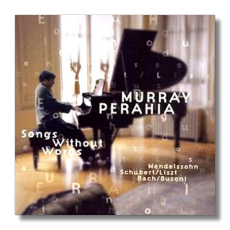
The Internet's Premier Classical Music Source
Related Links
- Latest Reviews
- More Reviews
-
By Composer
-
Collections
DVD & Blu-ray
Books
Concert Reviews
Articles/Interviews
Software
Audio
Search Amazon
Recommended Links
Site News
 CD Review
CD Review
Murray Perahia

Songs Without Words
- Bach/Busoni: Chorale Préludes (4)
- Felix Mendelssohn: Songs Without Words (15)
- Schubert/Liszt: Songs (4)
Murray Perahia, piano
Sony Classical SK66511 DDD 66:23
If Murray Perahia has made a bad recording, I am not aware of it. This is the repertoire that plays to his greatest strength – elegant simplicity – and a memorably fine CD is the result.
The program has been cunningly constructed. Romantic, virtuosic transcriptions of vocal music bookend a selection of 15 songs to which words never existed. The progression, from Bach's devoutness, to Mendelssohn's intimate charm, to Schubert's (as reinterpreted by Liszt) more public, even operatic display of emotions, sweeps the listener through the disc's 66-minute length. Perahia plays the Bach/Busoni with the clearest tone and the most connected line; comparisons with the bell-like playing of Dinu Lipatti are appropriate here. In "Nun komm, der Heiden Heiland" and "Ich ruf' zu dir, Herr Jesu Christ," the results are heart-heavy but not maudlin – shades of Tarkovsky's film "Solaris," which used Bach's music to great effect. (The other two works are "Wachet auf, ruft uns die Stimme" and "Nun freut euch, lieben Christen.") Mendelssohn's fleeting bits of Victoriana are freshened by Perahia's lively touch. Melodies sing, phrases are shaped like clay on a potter's wheel, and rhythms are given a gentle bounce. These are not substantial works, but Perahia gives them the same care that he gives to a Beethoven sonata.
Perahia ends the program with "Auf dem Wasser zu singen," "In der Ferne," "Ständchen," and "Erlkönig." His realization of Liszt's polyphonic effects in the first and third songs is both impressive and sensitive, and even his performance of the extraverted "Erlkönig" resists slam-bang effects. For Perahia, the essence of his virtuosity is as much in what he withholds as in what he gives.
The exceptionally literate booklet notes are by R. Larry Todd. The recording was accomplished over the course of two Decembers in studios just outside of Philadelphia and in London. The use of 24-bit technology contributes to the wonderful purity of the sound, but Perahia's role here cannot be overestimated.
Copyright © 2000, Raymond Tuttle




















